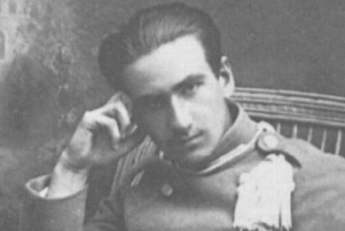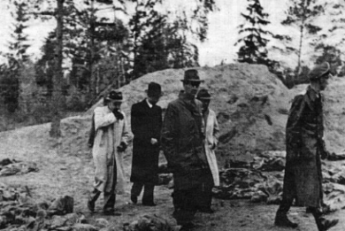
Józef Mackiewicz’s literary beginnings
Józef Mackiewicz discovered his passion for writing only during his studies. At school, his favorite subject was geography, and after school he loved to read Przyroda (‘Nature’) by Ivanov as well as Życie Zwierząt (‘Life of Animals’) by Bremen. It was only when he began studying natural science in 1921 that his first essay was published in ‘Dziennik Poznański’.
In November 1921, Mackiewicz began working at the Zoological Museum in Warsaw as an assistant curator of vertebrate animals. In the meantime, he publishes his debut literary work List do żołnierza – kawalerzysty (‘Letter to a soldier – cavalryman’), in which he described his arrest by Lithuanians in 1920: “The custom of feeding prisoners during the first days of transport is completely absent, and what is worse, the Lithuanian soldier does not have this respect or even friendship for a soldier in general, there is lack of the smallest military tradition (…) I remember how we were driven away from the well, even though we were falling from thirst. ” The writer presented Lithuanian captivity more than once, either in the debut collection 16-go między trzecią a siódmą (‘The 16th Between Three and Seven’) or in the book Prawda w oczy nie kole (‘Truth Did Not Hit the Eyes’).
In May 1922, the student Mackiewicz quit his job as an assistant curator. He did not finish his studies as he preferred to engage in journalism. First, he started working in ‘Kurier Poranny’ as a correspondent, then he worked in ‘Słowo’- a conservative Vilnius daily magazine. Mackiewicz’s activity was very versatile, but he mainly fought with the Polish administration, which was trying to destroy the multinational and multireligious mosaic of the former Duchy of Lithuania. He also wrote reports on his travels around the Borderlands. Józef owes both the publication of his first essay and the work in ‘Słowo’ to his older brother – Stanisław Cat-Mackiewicz, who initially worked for ‘Dziennik Poznański’ and then was the editor-in-chief of ‘Słowo’. Over time, Józef became one of the most frequently printed columnists there. Initially he used the initials “m.”, “until” or “Ali”. And then, more and more often, he started more specifically with “J.M.”, right down to the full name. One of the journalists, Karol Zbyszewski, recalled after years of work in the newspaper: “It was funny in the editorial office. All young people. Jokes, nonsense, games. Józef was the driving force. The editor-in-chief, Stanisław Cat-Mackiewicz, sometimes invited us all, the entire editorial team, to George for dinner. Dumplings, roulades, dessert. He steeled the wine. And immediately after dessert, he ran out. Then Józio took the command. He ordered mountains of pancakes, lakes of vodka. Of course, attached to the bill, at the expense of the ‘Słowo’. “
“Word” started an indirect fight with the Communist Party of Poland and the Soviet agents. It was then that, on the pages of ‘Słowo’, Józef Mackiewicz began his literary and journalistic struggle against communism, with which he fought until his death.
As a writer, he tried his hand in 1931, when he and Kazimierz Leczycki wrote the play Pan poseł i Julia (‘Mr MP and Julia’) which was later staged in Vilnius. Two years later, Wileńska powieść kryminalna (‘Vilnius Criminal Novel’) is written with a group of authors under the common pseudonym Felicja Romanowska. He made his debut entirely independently in 1936 with a volume of short stories entitled 16-tego pomiędzy trzecią a siódmą (‘The 16th, Between Three and Seven’), where he showed a patriotic deformation of national stereotypes. Despite the writer’s best efforts, none of these works gained much publicity. Finally, recognition brought him the volume of reports Bunt rojstów from 1938, in which he showed the social and religious conflicts of the Vilnius and Polesie regions and criticized the Polish administration for its attitude towards the local population. The book, according to many critics, was a success because it showed how a false image of the eastern territories functioned in Polish public discourse.
The leitmotif of Mackiewicz’s works was to write about what is important, necessary and true. He wrote straight from the heart, strove for truth and justice, despised lies, which he often repeated in his works: “(…) concentrated human lie has a force whose limits we do not know yet …”. Descriptions of nature or events in his works have always been sublime and full of emotions. If only because it was based mainly on his own emotions and experiences.
Sources:
1. http://www.nowastrategia.org.pl/jozef-mackiewicz-pisarz-wyklety/
2. https://dzieje.pl/postacie/j%C3%B3zef-mackiewicz
3. https://culture.pl/pl/tworca/jozef-mackiewicz
4. Grzegorz Eberhardt “Pisarz dla dorosłych. Opowieść o Józefie Mackiewiczu”
Translated by Joanna Zawalska







